In Ancient Greek religion, Estia or Hestia (/ˈhɛstiə/; Greek: Ἑστία, “hearth” or “fireside”) is a virgin goddess of the hearth, architecture, and the right ordering of domesticity, the family, the home, and the state.
It was a difficult start to my road trip to the seaside town of Galaxidi. The rain poured down, washing out the view on all sides. A few bare branches were the only things visible as I tried to keep the car from aqua-planing on the turns. A two hour trip took a while longer but, as we emerged on the top of the mountains above Itea the sky cleared and a few rays of brilliant sunshine pierced the clouds.
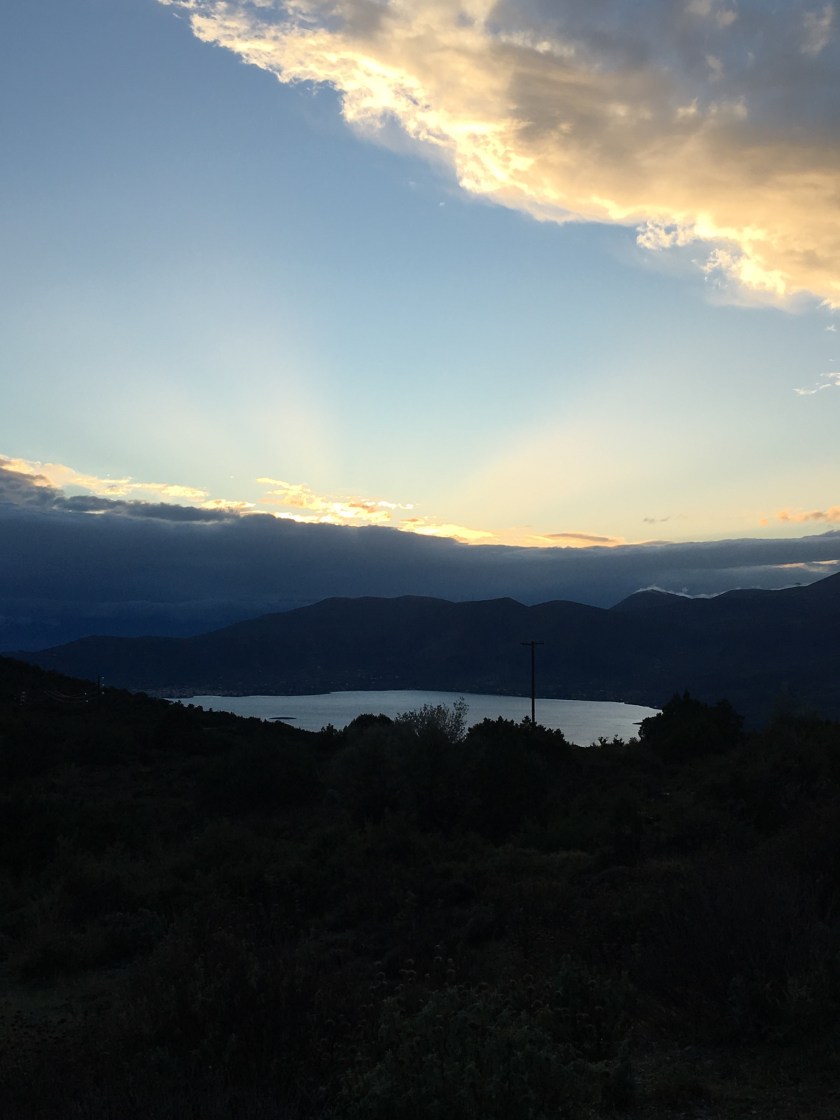
The charm of Galaxidi was restored, and so was my mood, over a cup of mountain tea taken at the hotel with some of the other visitors. We were all here for the annual cutting of the traditional vasilopitta at the Estia Agios Nikolaos, (https://www.estia-agios-nikolaos.org), a community where adults with special needs live, work and share their free time together with those caring for them. In this, Estia Agios Nikolaos is quite unique, and not only in Greece. It is also one of the few such communities worldwide which is not affiliated to one particular religious faith, and this inclusiveness is the main point of attraction for people all over the world who come to live and work here, making Estia a vibrant and exciting place.

Everyone had dinner together at a wonderful seaside taverna. I sat next to Clara (German, speaking fluent Greek) and Maxime (French, having just signed up for his second year, rapidly improving Greek), two vivacious and inspiring young people, who talked about their work with enthusiasm. Also present were numerous locals, such as the pharmacist who donates all meds for the community, and a lady who provides fish from her fish farm once a week. And, making a star appearance, was Estia’s first baby, Mia, born to a couple who work as carers – a source of endless fascination and delight for all.
Next morning, after a delicious breakfast of home-made delicacies and a walk in the port, we drove to Estia, where everyone was gathered in the assembly hall.

The festivities started with a couple of songs (this video might look as if it’s facing sideways, but it will right itself once you click it. The mysteries of technology…)
Then the cutting and sharing of the vasilopitta.

We visited the ceramics shop, where colorful creations were on offer.

The wonderful vegetable garden,

complete with scarecrow,
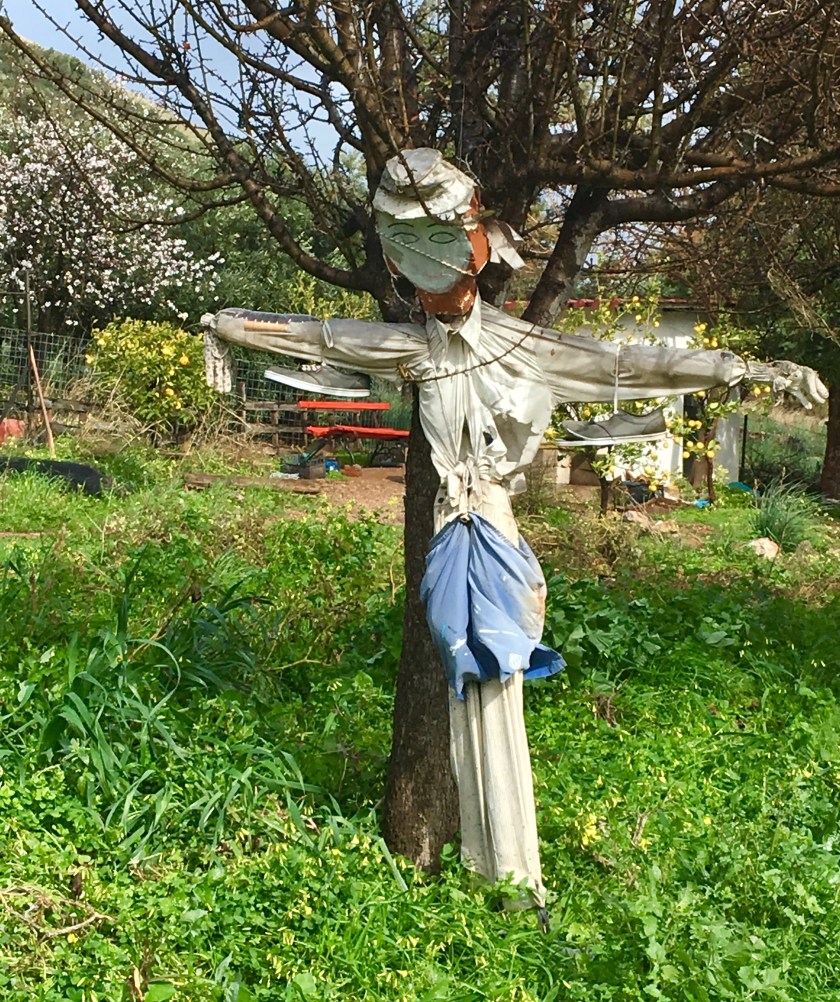
and free-range chickens.
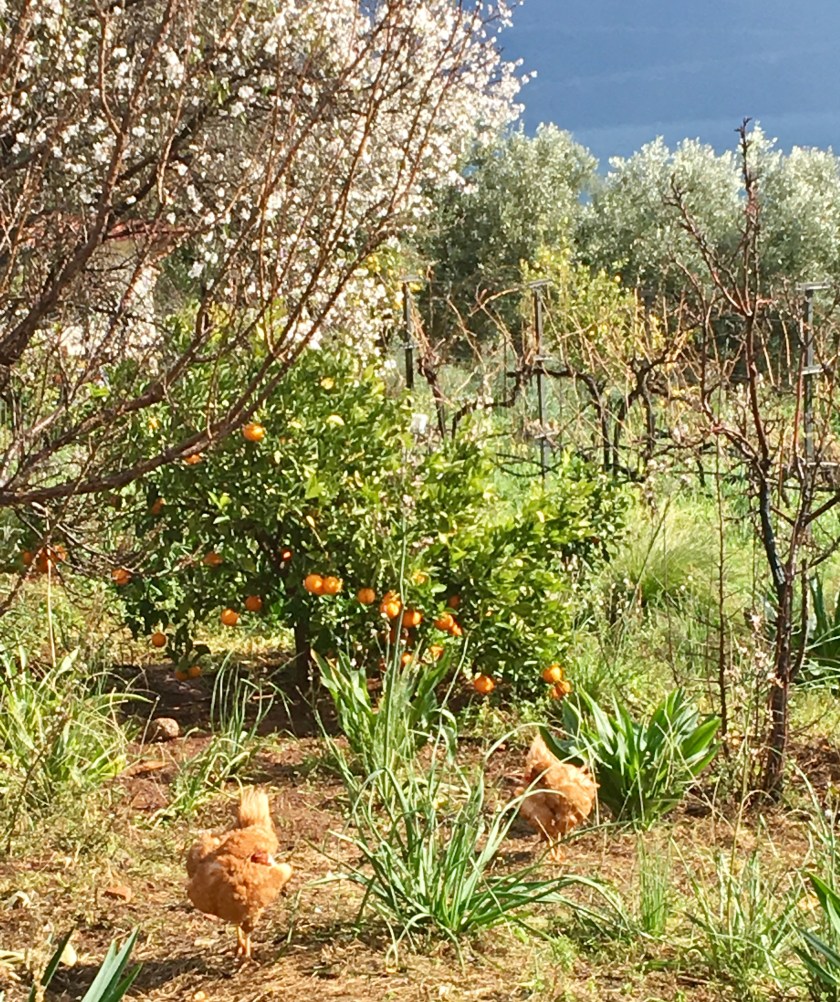
And finally one of the four residences, which in total cater for 45 people, of whom 22 have special needs (at the moment there is space for two more.) In ‘Estia Agios Nikolaos’ all the members live in small family structures, which comprise 6-9 special needs guests, 2 to 3 professional caregivers and 2 to 3 volunteers.

The entrance with its cats and box of fresh home-grown veggies.
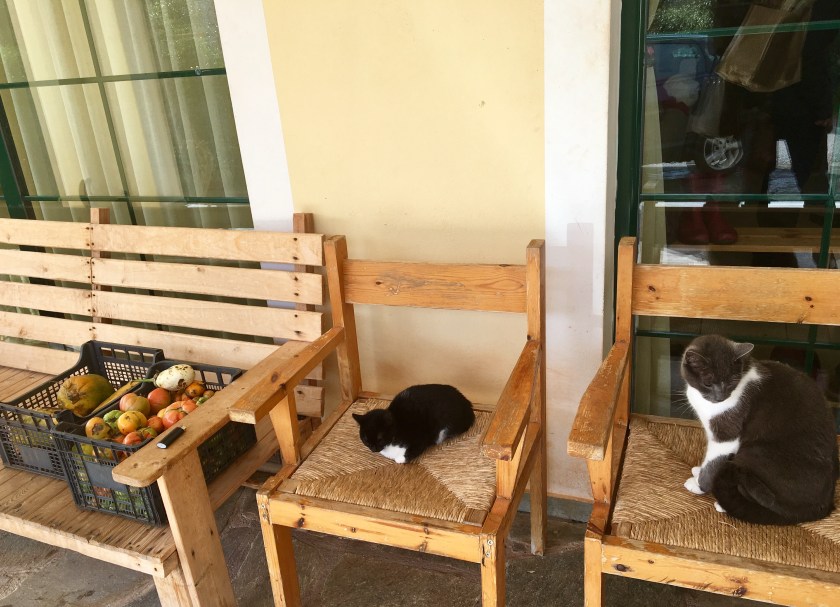
A cozy living area

Complete with music corner

Fireplace

A large dining table for communal meals

A lovely kitchen
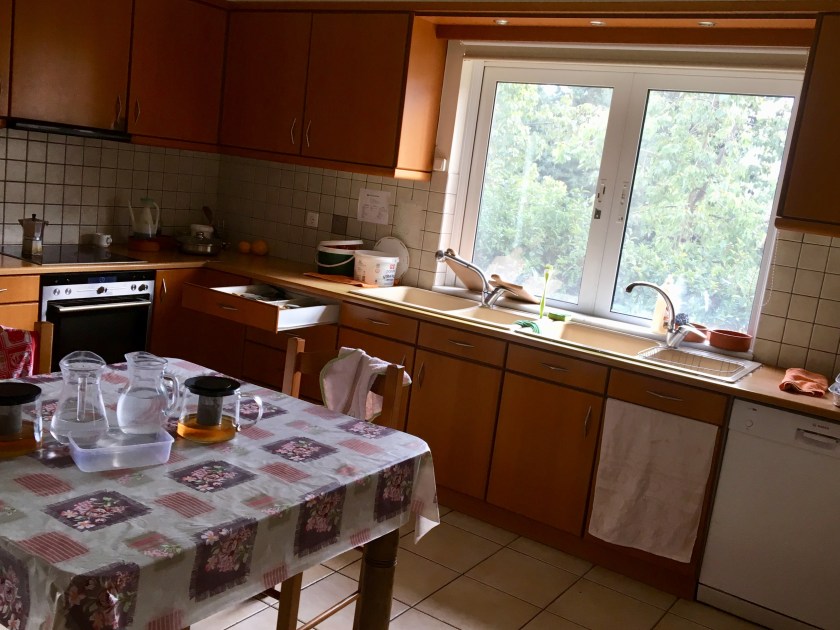
And a well-stocked larder.

We went on to visit another building which is used for various activities, fronted by a shady terrace for barbecues and ad hoc concerts. This doubles as the Kafeneion (café), a gathering place for Sunday coffee with the locals and evening parties.
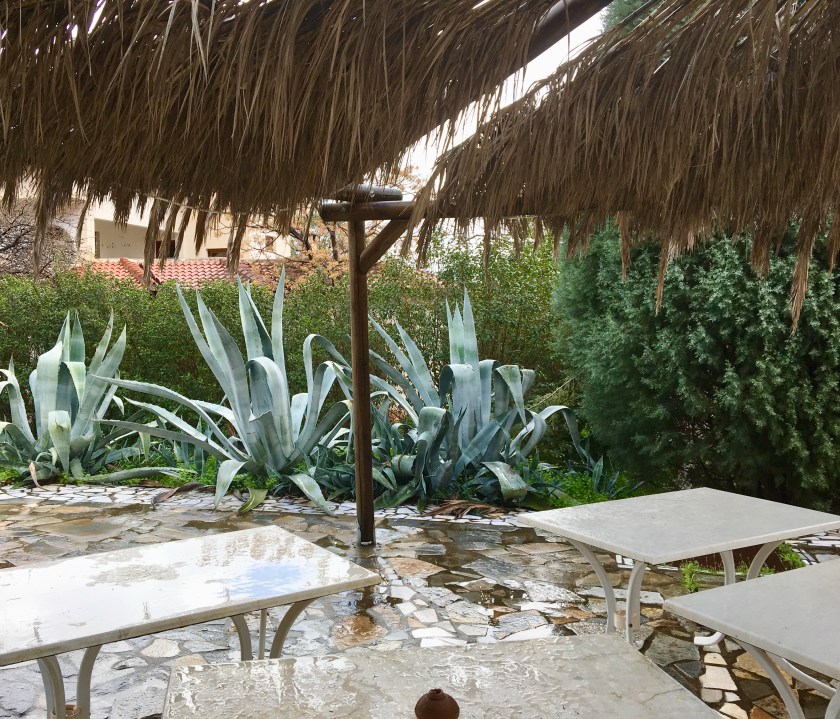
A brand new kitchen, designed by an architect friend and donated by IKEA (the floor had been freshly washed), will be used for the new bakery and pastry workshop.
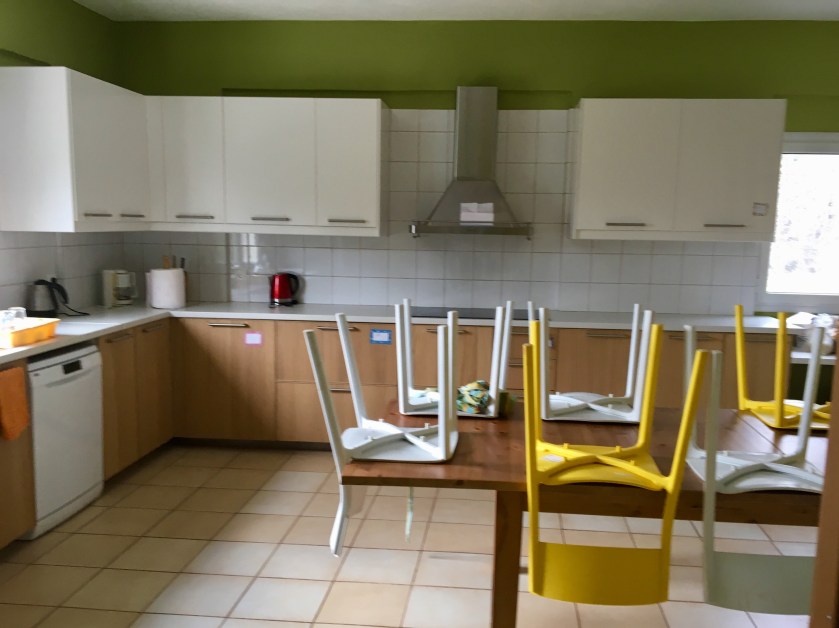
And there is a loom for weaving

Maren, who is German, is responsible for one of the houses and took us on tour, while explaining that the residents really look forward to their activities each morning after breakfast: either working in the garden or in the pottery and jewelry workshops.
The afternoons are devoted to music, exercising, walking, and in the summertime, swimming in the sea nearby. Besides the staff, there are professionals (most of them on a volunteering basis) providing specific therapeutical activities such as art therapy, physiotherapy, gymnastics and music therapy.
During the weekends, individuals can choose the activities they would like to participate in. There are various artistic and spiritual pursuits on offer, in connection to the local communities, such as outings to musical events, theater and cinema, church attendance and participation in local celebrations. Every Sunday late afternoon, the entire community gathers in the Kafeneion for cake, music and games, often hosting visitors from the local community.
Each new resident is taken in for a month’s trial, to see how well he or she will fit in. Most adapt well, some don’t. After the extensive mutual screening there is a mandatory period of at least one month when the potential resident returns to his/ her home so that each side, resident, family and the Estia team can calmly make up its mind. Sometimes parents find they miss their child too much, and prefer to keep them at home.
Residents join in on outings and trips whenever possible and have even been abroad, which I found impressive, due to the logistic problems needing to be solved.
The cornerstone principle of ‘Estia Agios Nikolaos’ is that “each person is unique and can be helped to develop his or her unique capabilities in a nurturing environment via creative work, artistic stimuli and direct interaction with nature.” Efforts are made to treat each person as an individual – the girl who made a friend in town goes for sleepovers to her house and is allowed to invite her in turn, those who don’t like to sleep after lunch are not made to have a siesta, and so on. Such an anthropocentric approach is quite revolutionary in what remains, in essence, an institution.
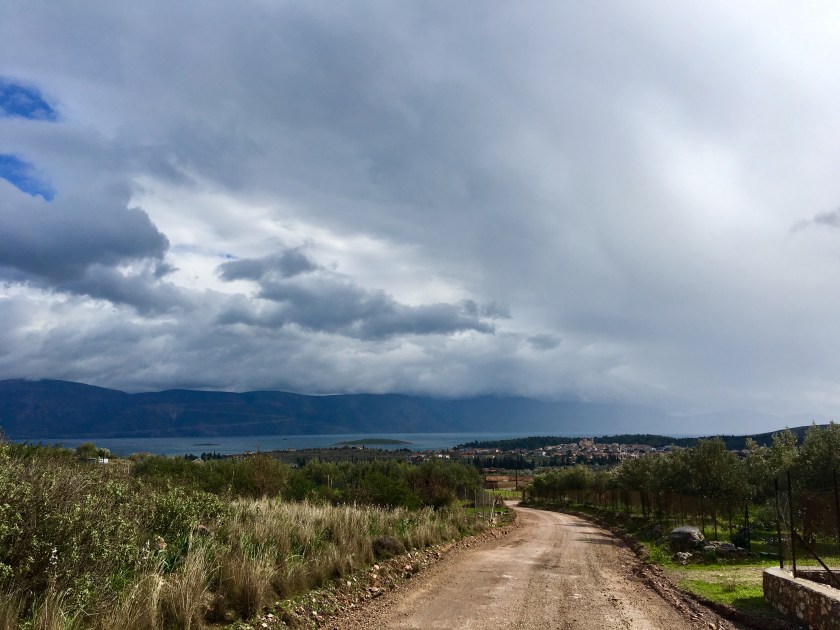
Giovanna Kampouri, the president of the foundation which supervises the organizers, explained the community’s vision:
“For our residents with special needs, Estia Agios Nikolaos is often their only family and home. Many of them do not have a family that can care for them, and very sadly, most will face the trauma of losing their parents. It is our mission to be able to provide them with a lifelong, stable and loving home. The biggest challenge will come when the first residents will age (in the case of those with Down Syndrome, with dementia). We are now starting to study what it will take to build our 5th home, with special facilities for this group. We need to solve many issues for this, in addition to money, and particularly Greek legal requirements and infrastructure.
On a day to day basis, in the middle of the crisis, Estia has not only survived but managed to thrive, thanks to the love and generosity of an ever widening circle of supporters in Greece and abroad. I believe that this is thanks to its message of inclusiveness, which is filling a growing need in all our societies (to balance the opposite trend of nationalism and xenophobia) We are thankful for this, as we need to continue and to expand our possibility to provide life-long care for our residents. Due to the crisis, the ability of many of our residents to compensate for the patchy payments by EOPYY(social security) been reduced, and we have been able to fully cover this and to even offer full ‘scholarships’ to new residents from every part of Greece.”
And of course, the work is never done. There are plans for acquiring more animals, such as bees and a donkey, building a wood-fired oven, planting olive trees.
I left feeling invigorated and inspired – some truly remarkable work is being done here. If you want to know more, and meet the principals of this story, watch the wonderful video made by Marianna Economou.


how wonderful
LikeLike
This moved me greatly, Marina. I have rarely seen such a heartwarming place, and lovely caring people. I only live on a retirement pension, but I have made a small donation through their website, via Paypal, as I could not let such good work go unrewarded.
Best wishes, Pete.
LikeLike
That’s so nice of you, Pete, thank you on their behalf. I must admit I was very impressed and touched by the work done there, and the family atmosphere and enthusiasm.
LikeLiked by 1 person
Just to let you know that I have already received a nice letter from them via email, thanking me for the donation. I hope to be able to send them some more money in the future.
Best wishes, Pete.
LikeLike
They were thrilled by your donation – every little bit counts. X
LikeLiked by 1 person
Bravo!!!
LikeLike
Bravo!!!
LikeLiked by 1 person
What a wonderful place!
LikeLiked by 1 person
It was, Deborah. Heartwarming 🌺
LikeLiked by 1 person
I am touched by this wonderful story of people making contact with those in need and providing a home, a vision, a purpose, and community. In this broken, selfish world, it’s good to know that there is a place called Estia. Thank you for sharing this, Marina.
LikeLiked by 2 people
I was very moved myself, Sharon. Usually we read about and see people being cruel to others.
LikeLiked by 1 person
How inspiring. There’s such a lot of love and thoughtfulness there.
LikeLiked by 2 people
Indeed🌺
LikeLiked by 1 person
Moving and inspiring. Thanks for sharing this Marina. I must show to a couple of friends who work in this field in UK.
LikeLiked by 1 person
What a good idea! Please do🌺
LikeLike
What a wonderful place. To keep going despite all the financial difficulties Greece has suffered in recent years is very impressive too.
LikeLike
It’s because people still find it in them to be giving, despite everything. Some people, at any rate😊
LikeLiked by 1 person
This looks a truly inspirational project – well described and photographed
LikeLike
Thank you, Derrick. Worth trying to help them…
LikeLiked by 1 person
Would that the world were filled with such places.
LikeLike
Yes, wouldn’t it?🌹
LikeLike
How marvellous – if only there were more of these places to make life better for everyone who needs a safe and stimulating environment.
LikeLike
I know. It must be a relief for their families, too.
LikeLike
It is heartwarming to learn that such a place exists. I hope that its message spreads and that others are moved to create similar sites around the globe. Thanks for sharing this bit of heaven-on-earth with us.
LikeLiked by 1 person
I’m glad you enjoyed reading about it!
LikeLike
Marina thank you for sharing. It is such a beautiful place. Beautiful pictures.
LikeLike
A place where people are taken care of and valued. Yes, this is just what I needed to read today. Thank you, Marina.
LikeLike